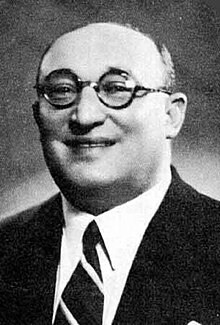Sabri al-Asali
| Sabri al-Asali صبري العسلي |
|
|---|---|
 |
|
| Prime Minister of Syria | |
|
In office 14 June 1956 – 1 February 1958 |
|
| Preceded by | Said al-Ghazzi |
| Succeeded by | Nur al-Din Kahala |
|
In office 13 February 1955 – 13 September 1955 |
|
| Preceded by | Faris al-Khoury |
| Succeeded by | Said al-Ghazzi |
|
In office 1 March 1954 – 19 June 1954 |
|
| Preceded by | Adib al-Shishakli |
| Succeeded by | Said al-Ghazzi |
| Vice President of the United Arab Republic | |
|
In office 7 March 1958 – 7 October 1958 |
|
| Preceded by | Office established |
| Succeeded by | Akram al-Hawrani |
| Personal details | |
| Born | 1903 Damascus, Ottoman Syria |
| Died | 13 April 1976 (aged 72–73) Damascus, Syria |
| Political party | National Bloc |
| Religion | Sunni Islam |
Sabri al-Asali (Arabic: صبري العسلي; 1903 – 13 April 1976) was a Syrian politician and a three-time prime minister of Syria. He also served as vice-president of the United Arab Republic in 1958.
Al-Asali was born into a wealthy landowning family in Damascus. His uncle, Shukri al-Asali, was a prominent national leader, and a deputy in the Ottoman Parliament. Shukri al-Asali and a number of other nationalist leaders were executed in Damascus and Beirut by the Ottoman wāli, Jamal Pasha, on 6 May 1916.
Sabri al-Asali attended Damascus University and graduated with a law degree in 1925. That same year the Great Syrian Revolt against the French occupation erupted, and al-Asali participated in the uprising by helping smuggle arms and supplies to the Syrian fighters in the Ghouta area. Following the suppression of the revolt, al-Asali was exiled by the French authorities to Saudi Arabia where he became a special advisor to the Saudi King Abd al-Aziz, alongside another exiled Syrian leader, Shukri al-Quwatli.
Al-Asali and Quwatli returned to Syria in 1932 following a general amnesty. In 1933 al-Asali, along with a number of influential Arab thinkers, became a founding member and general-secretary of the League of National Action, with the aim of countering European colonial influence. Other founding members included the historian and professor Constantin Zureiq, the philosopher Zaki al-Arsuzi and the politician Muhsin al-Barazi. The League was very successful in Syria and Lebanon, and called for the abolition of the French and British mandates and the economic integration of Arab countries.
...
Wikipedia
